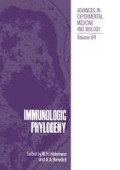Abstract
It is beyond doubt that the phylogeny of species has not only led to the relatively simple process of immune elimination, but also to a complicated mechanism which limits the immune response. It seems that by such an immune regulation the organism has become able to coexist with certain foreign agents without overt problems. This unresponsiveness can be called “enhancement” and a heated debate rages between protagonists and antagonists as to whether “tolerance” is the most extreme form of this immune regulation. In any case, the immunological unresponsiveness in face of a fully developed machinary seems to be the greatest achievement which phylogeny of species has accomplished in this field. This is especially evident with regard to the tolerance of the self, allowing autoagression only as a state of disease. Inasmuch as true autoimmune diseases are manifested only in mammals (-so far as I know-) the need for immunological unresponsiveness might also be the greatest in the mammalian species. Despite the general validity which enhancement could very well have in cases like autoimmunity and tumorigenesis, I have elected to limit my presentation to the field of transplantation. Regardless whether we speak of tolerance or of enhancement, any specific unresponsiveness depends on antigenicity. With reference again to the phylogenetical context, the transplantation antigensappear to be the most fundamental expression of the divergent development of species. The problem of “antigenic strength” is an inherent question of interest in immunologic phylogeny. The polymorphism in cell surface antigens might be required to maintain the integrity of the individual. However, the capability to produce specific unresponsiveness counteracts in principle the incompatibility between normal outbred individuals. But transplantation antigens and the induction of specific unresponsiveness toward them appear to play a major role for a life-sustaining heterozygosity by inhibiting the maternal graft-versus-host-reaction against her offspring, histoincompatible from the paternal line (1). All these examples indicate the importance which the ability for specific immunological unresponsiveness constitutes on the phylogenetical vertebrate level.
Access this chapter
Tax calculation will be finalised at checkout
Purchases are for personal use only
Preview
Unable to display preview. Download preview PDF.
References
Palm, J., Transplantation Proc., 2:162 (1970).
White, E. and Hildemann, W.H., Transplantation Proc., 1:395 (1969).
Fabre, J.W. and Morris, P.J., Transplantation, 14:634 (1972).
Jenkins, A.McL. and Woodruff, M.F., Transplantation, 12:57 (1971).
Kim, J.P., Shaipanich, T. and al., Transplantation, 13:322 (1972).
Ockner, S.A., Guttmann, R.D. and al., Transplantation, 9:39 (1970).
Marquet, R.L., Heystek, G.A. and al., Transplantation Proc., 3:708 (1971).
Bitter-Suermann, H., Transplantation, 17:75 (1974).
Salaman, J.R., Elves, M.W. and al., Transplantation Proc., 3:577 (1971).
Hildemann, W.H. and Mullen, Y., Transplantation, 15:231 (1973).
McKenzie, I.F.C. and Snell, G.D., J.Exp.Med., 138:259 (1973).
Wigzell, H., Transplant.Rev., 3:86 (1970).
Thoenes, G.H., White, E. and al., J. Immunol., 104:1447 (1970).
Thoenes, G.H., Urban, G. and al., Immunogenetics, 1:239 (1974).
Thoenes, G.H., White, E., Transplantation, 15:308 (1973).
Hume, D.M., Sterling, W.A. and al., Transplantation Proc., 2:361 (1970).
Mahabir, R.N., Guttmann, R.D. and al., Transplantation, 8:369 (1969).
Gleichmann, H., Gleichmann, E. and al., J.Exp.Med., 135:516 (1972).
Hard, R.C., Moncure, C.W. and al., Lab.Invest., 28:468 (1973).
Steinmuller, D., Transplantation Proc., 2:438 (1970).
Lance, E.M., Levey, R.H. and al., Proc.Nat.Ac.Sci., 64:1356 (1969).
Calne, R.Y., in:Immunological aspects of transplantation surgery, ed. by R. Calne, MTP, Lancaster, England, 1973, p.296.
Smit, J.A., Myburgh, J.A., Transplantation, 18:63 (1974).
Wilson, R.E., Maggs, P.R. and al., Transplantation Proc., 3:705 (1971).
Caves, P.K., Dong, E. and al., Transplantation, 16:252 (1973).
Warren, R.P., Lofgreen, J.S. and al., Transplantation, 16:458 (1973).
Brent, L., Hansen, J.A. and al., Transplantation, 15:160 (1973).
Holter, A.R., Neu, M.R. and al., Transplantation Proc., 5:593 (1973).
Corry, R.J., Winn, H.J. and al., Transplantation Proc., 5:733 (1973).
Russell, P.S., Chase, C.M. and al., Transplantation Proc., 7:345 (1975).
Owen, E.R., Transplantation Proc., 3:562 (1971).
Shumerska, T., Betel, I. and al., Transplantation Proc., 3:708 (1971).
Author information
Authors and Affiliations
Editor information
Editors and Affiliations
Rights and permissions
Copyright information
© 1975 Springer Science+Business Media New York
About this chapter
Cite this chapter
Thoenes, G.H. (1975). Induction of Unresponsiveness to Organ Transplants in Congenic Strains of Rats and other Mammals. In: Hildemann, W.H., Benedict, A.A. (eds) Immunologic Phylogeny. Advances in Experimental Medicine and Biology, vol 64. Springer, Boston, MA. https://doi.org/10.1007/978-1-4684-3261-9_46
Download citation
DOI: https://doi.org/10.1007/978-1-4684-3261-9_46
Publisher Name: Springer, Boston, MA
Print ISBN: 978-1-4684-3263-3
Online ISBN: 978-1-4684-3261-9
eBook Packages: Springer Book Archive

